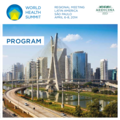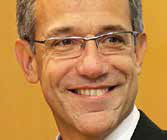World Health Summit Regional Meeting 2014 - Brazil, São Paulo


Program
The program is organized along five tracks:
- Healthy Life Expectancy
- Urban Health / Health in Megacities
- Increased Research Capacity to Incorporate Technologies
- Management of Health Systems to Ensure Universal Coverage
- Health Education
Simultaneous translations was provided for all sessions (English - Portuguese.)
 Final Program13 MB
Final Program13 MB
1. Healthy Life Expectancy
Health in Latin American countries has improved significantly in recent years with observed increases in life expectancy. Although there have been considerable progresses in infant mortality, infectious and others diseases associated with poverty, they are still important public health issues, that are now accompanied by the growing burden of chronic diseases. To ensure that people have the possibility not only to survive and live longer lives but also to stay healthy,); it is necessary: a. maintain improving survival (reduce child and maternal mortality); b. reduce burden of disease (AIDS, tuberculosis, malaria, etc plus NCD. c. lower levels of risk factors (smoking, access to water and sanitation etc). Concerted strategies targeting these goals and the huge social inequalities present in the Region will bring a better health for the population.
Subthemes:
- Neuropsychiatric Disorders
(USP Psychiatry Institute/Secretary of Health – São Paulo) - Cardiovascular Diseases
(USP Heart Institute/ Secretary of Health) - Cancer
(USP Cancer Institute/ Secretary of Health – São Paulo) - Overweight/Diabetes – The Obesity Epidemic: Targeting the Causes
(USP/UNICAMP) - Chronic Respiratory Disease
(USP Heart Institute/ Secretary of Health – São Paulo)
And more...
2. Urban Health / Health in Megacities
Urbanization is one of the most important global phenomena of this century, with significant impacts on health. Brazil and Latin America constitute one of the most urbanized regions in the world with approximately 80% of the population residing in urban areas. The region has 33 cities with more than two million inhabitants, of which four, Mexico City, São Paulo, Rio de Janeiro and Buenos Aires, are among the 20 largest cities in the world. Rapid urbanization, with few regulatory and control mechanisms, brought huge impacts on population health. Problems such as inadequate sanitation, poor housing conditions, physical and chemical pollution of air, water and land, violence and drug use are present in major cities. These challenges call for approaches that address the social, cultural, economic, environmental and political determinants of health in order to transition to quality of life, equity and sustainability.
Subthemes:
- Metrics for Measuring Urban Health Inequalities
(USP Public Health School/Johns Hopkins) - Successful Case Studies in Urban Intervention for Health Promotion
(Public Health Schools/ Johns Hopkins - USA) - Pollution/Respiratory Diseases
(USP/WHO) - Drugs – Crack
(USP Psychiatry Institute/Secretary of Health – São Paulo) - Mental Health (Depression, Suicides, etc.)
(USP Psychiatry Institute/Secretary of Health – São Paulo) - Violence and Health in the Urban Space
3. Increased Research Capacity to Incorporate Technologies
Population aging is accelerated and thus increases the demand for health services more sophisticated and expensive. To address the demographic and epidemiological changes that have been observed in Latin America it is necessary to have mechanisms to facilitate the incorporation of scientific knowledge in the formulation of public policies, particularly in meeting the priorities, needs and demands of the population. The role of basic science in health and industrial complex in the technological innovation should be encouraged to meet these priorities, combined with the production of knowledge and the development of technologies provided by academic institutes in the field of drugs / medicines, vaccines, diagnostic reagents, equipment, and blood products.
Subthemes:
- Innovation for Health System: Cause of Success in Latin America
(Interfarma/Ministry of Health/ABRASCO) - Assessment and Financing to Incorporate New Technologies for Health in Latin America
(Interfarma/Ministry of Health/ABRASCO) - Clinical Trials in Latin America: Challenges and Perspectives
(Interfarma/Ministry of Health/ABRASCO) - Capacity Building in Low- and Middle Income Countries
(IAMP – Academies) - Challenges in Biomedical Informatics to the Next Decade
(Brazilian Society of Health Informatics) - Incorporation of New Vaccines in the Health System
- Transplants
4. Management of Health Systems to Ensure Universal Coverage
The organization of health services in Latin America has experienced significant changes imposed by new epidemiological realities associated with social demands and political-economic conjuncture. Brazil presents particularities in this field, while providing a system, the National Health System, which given its universal character faces challenges to ensure quality of services and meet the demands of the population. Among the mechanisms used to strengthening the health systems are the public-private partnerships, seeking to enhance government capacity with private sector activity, further enhancing the supplemental character of the latter and ensuring universal coverage. This and other initiatives aim to ensure universal provision of good quality services.
Subthemes:
- WORKSHOP - Universal Health Coverage: Building Universal and Equitable Health Systems
- Financing a Universal Health System: The Public-Private Mix
(Interfarma/Ministry of Health/ABRASCO) - Health Systems Organization: Towards Equity
(Interfarma/Ministry of Health/ABRASCO) - Health in the Post-2015 Development Agenda
(Interfarma/Ministry of Health/ABRASCO) - Health Systems and Universal health Coverage: Global Lessons from E7
- Innovations in Surveillance, Prevention and Control of Infectious diseases
5. Health Education
Training of human resources in the medical field involves combining technical expertise with ethical, humanistic and social responsibility. However, the contents and the teaching model need to evolve over time, to account for the emerging challenges to health systems such as technological innovation, epidemiological and demographic transitions, the diversification of areas of medical knowledge, as well as the speed with which knowledge is produced and, in some cases, transformed into new technologies. This requires adaptation of health education and research to meet local priorities and a redefinition of the pedagogical model used in the training of medical students, encouraging undergraduate research activities, use of information technology, diversification of learning scenarios, recovery of humanization in the practice of clinical care, a competency-driven approach to curriculum and team-based learning, inter and transprofessional education among others.
Subthemes:
- Young Physician Leaders in Latin America
(IAMP/Academies) - TIC and Health Education
- New Voices in Global Health 2014 – Lancet
- Academic Health Centers Engaging the Community
M8 Alliance Declaration 2014
Welcome Messages
The debate about health and its relation with social development has taken a prominent role in the discussions regarding public policies in Latin America in the recent years. Although the region has achieved significant results in the public health field, expanding services and coverage, especially for those living in vulnerable conditions, there are still serious challenges to be tackled.
Therefore, the reflection based on the different perspectives and experiences of these countries will contribute to build up a fortified response to improve our health systems and to maintain and increase our successes already attained, indeed.
In this context, I am deeply glad that Brazil has this chance to host Latin America’s World Health Summit Regional Meeting. This meeting will certainly encourage a profound reflection on such an important theme to our region. The opportunity has also huge potential to result in positive outcomes amid the sectors involved – researchers, health experts, academia, civil society, policy makers, and private initiatives.
Finally, I reiterate my expectations of an excellent meeting and wish to all participants a fruitful and rich event.
Minister Arthur Chioro
Ministry of Health
Brazil

Dear Friends, Dear Colleagues,
It is with great honor that we host, for the first time in Latin America, the World Health Summit Regional Meeting. We are delighted that the M8 Alliance of Academic Health Centers, Universities and National Academies has chosen Brazil to foster the second meeting outside Berlin and it is a privilege to warmly welcome you to São Paulo to discuss health care issues.
With the population rate increasing, megacities start presenting urban and public health problems. The current challenge is to find solutions worldwide. For three days, professors, graduate students, doctors, nurses, health managers, public health professionals, government and pharmaceutical industry will share their expertise to propose effective disease prevention and control.
We recognize that good health is primordial to supporting economic and social development and we are sure that this extraordinary gathering of excellent minds from relevant health care sectors will have global impact.
With warmest regards,
Prof. Giovanni Guido Cerri
President, WHS Regional Meeting – Latin Amercia 2014
Dean, University of Sao Paulo Medical School

Dear Friends, Dear Colleagues,
It is a privilege to have the opportunity to discuss public health and health care in Latin America with outstanding professionals from all over the world. Despite the significant improvement in our region, we need to debate the current challenges and find solutions to ensure the population’s welfare.
One of our main goals aims at discussing ways to increase healthy life expectancy, such as reducing child and maternal mortality, reducing the burden of infectious and parasitic diseases, and lowering the levels of risk factors: smoking, sanitation, access to water, etc.
Another focus point will be the impact of urbanization on people’s lives. It is fundamental to create polices that will minimize urban problems, such as inadequate sanitation, poor housing conditions, water and air pollution, violence and drug abuse.
The discussion among key players in health on how to increase the research capacity in Latin America to incorporate technologies will be of great importance, as will be the initiatives to ensure universal health coverage and services of good quality. Health education that implements technical expertise, ethical, humanistic and social responsibility will be another relevant subject of this meeting.
We are sure this first WHS Regional Meeting in Latin America will be of great significance to strengthen existing partnerships and will allow us to gather ideas for the benefit of health worldwide.
With kindest regards,
Prof. José Otávio Costa Auler Júnior
Chair, World Health Summit 2014
Vice-Dean
University of São Paulo Medical School

